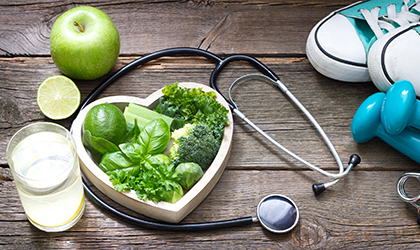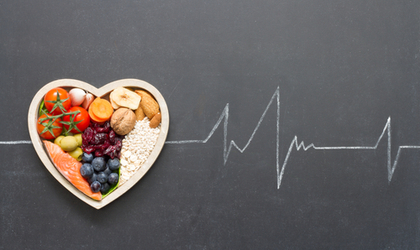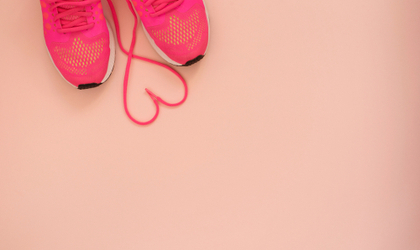Around 60 per cent of your body is made of water: it makes up approximately 79 per cent of muscle, 73 per cent of your heart and brain, and even 31 per cent of your bones (i). Blood is mostly made of water too. But if you have an excessive build-up of water (or fluid) in the circulatory system, body tissues or body cavities, it’s known as fluid retention (or water retention).
Experts believe women are more prone than men to fluid retention (ii), though nobody really knows whether fewer men are really affected than women or whether men are simply less likely to seek professional help for fluid retention symptoms.
What are the symptoms?
The signs of fluid retention are often not that obvious, especially to other people. They include swollen ankles and knees, swollen breasts and breast tenderness, swollen fingers, abdominal bloating and even puffiness around the eyes. Some people experience one or two of these symptoms, whereas others may find they’re affected by all of them. But however many symptoms you experience, fluid retention can be highly uncomfortable and even embarrassing.
Fluid retention can be caused by a medical issue or it may have no known cause:
Medical fluid retention – which is often referred to as oedema – is caused by an underlying medical condition such as heart or kidney failure, diabetes, chronic lung disease, thyroid disease, liver disease, or taking certain medicines such as corticosteroids or treatments for high blood pressure. Taking oral contraceptives can also cause medical fluid retention. There are lots of different medicines that can be prescribed for oedema, depending on which condition is causing it, including diuretics (medicines that make the kidneys to excrete more water). However, the vast majority of fluid retention cases aren’t caused by a medical condition.
Idiopathic fluid retention is fluid retention that has no obvious cause – that is, it isn’t caused by a diagnosed underlying medical condition. In such cases doctors don’t have much help to offer other than to give general lifestyle advice.
What causes fluid retention?
Most experts agree that the main cause of idiopathic fluid retention is the leaking of fluid from tiny blood vessels – or capillaries – into fat and skin tissues. Capillaries supply the body’s interstitial fluid (the thin layer of fluid surrounding the cells with nutrients, vitamins and oxygen, making them available for the cells to use. The capillaries – which are hundreds of times thinner than a strand of hair – also carry away waste products from the cells, again via the interstitial fluid.
But sometimes, capillaries can become ‘leaky as the collagen breaks down. This change in capillary wall permeability means fluid can escape into the spaces between the cells in the surrounding tissue, where it becomes trapped instead of being drained away. This causes the swelling that you find with fluid retention.
Experts aren’t sure why capillaries ‘leak’ in some people, but they do know that anything that makes the blood vessels dilate (or widen) can make the problem even worse, such as heat or stress. However, diuretics – medicines that force the kidneys to remove a higher volume of fluid from the blood – are thought to cause more harm than good in cases of fluid retention caused by ‘leaky’ capillaries, as they may interfere with the body’s salt/water balance.
Other causes of fluid retention include problems with the lymphatic system, which also drains fluid from tissues, as well as medical conditions such as heart and kidney problems. A severe lack of protein in your diet may also affect your body’s fluid balance, as may very low levels of certain B vitamins (B1, B6 and B5).
Are you at risk?
Having one of the associated medical conditions or taking certain medications can cause medical fluid retention, but there are several factors that may increase your risk of having non-medical fluid retention too, including the following:
-
Physical inactivity is thought to be necessary to keep the lymphatic system stimulated and working correctly. This may explain why some people experience fluid retention after a long journey, or when they’ve been standing still for a long time. Also if you stand or sit for extended periods, your capillaries tend to work less effectively as they are powered by muscle contractions.
-
Being overweight or living with obesity can cause fluid retention too, as both may affect your circulation.
-
Pregnancy – particularly the later months – can also cause a build-up of fluid in the body, causing swollen legs, feet and ankles. This is thought to be partly caused by the weight of the uterus on the veins of the pelvis. Thankfully this is often a temporary problem, and many women find their fluid levels return to normal after the birth.
-
High sodium diets are well known for causing fluid retention because salt helps the body hold on to water. The recommended amount of salt adults should eat daily is 6g, but it’s thought that most people in the UK eat around 9g of salt a day.
-
Hormones are a well-known risk factor for fluid retention, with many women experiencing swelling and bloating just before and during their period. Again, experts aren’t really sure why this happens, with some claiming hormone imbalances may be to blame.
Fluid retention: can diet help?
Many experts believe that some of the things you eat and drink can have an effect on fluid retention, including the following:
Salt
Salt encourages the body to retain fluid, so try not to add any to your food (if you need extra flavour, try experimenting with herbs and spices instead). However it’s widely accepted that the majority of salt in our diet comes from processed foods rather than salt found in natural foods or the salt we add to food in cooking or at the table.
As a rule of thumb, check a food's label before you buy and aim for those that have less than 0.3g salt/0.12g sodium per 100g while avoiding any that have more than 1.5g salt/0.6g sodium per 100g.
Smoked foods
Smoked foods, for instance, tend to be very high in salt. But also look out for salt levels in meat products, bread, pastries, biscuits, ready meals, breakfast cereals, sauces (including ketchup), stock cubes and other flavourings, savoury snacks, tinned foods, sandwiches and cheese.
Potassium
Eating plenty of foods that are rich in potassium may help to regulate your fluid levels by reducing the amount of salt in your body. Most fruits contain good levels of potassium, especially bananas, but you can also get it in avocados, sunflower seeds, tomatoes, dried apricots, raisins, sultanas and nuts.
Antioxidants
Found in fruit and vegetables, antioxidants are widely accepted as being important for health. There are many different types, one of which is flavonoids. One particular type of flavonoid, however, is thought to have major benefits for capillary health, called anthocyanidins. These nutrients are thought to help by supporting and repairing the body’s collagen – a protein that provides structure for the connective tissues – including the collagen found in the capillaries. Anthocyanidins are found in richly coloured dark fruit such as cherries, blackberries, black grapes, blueberries, cranberries, raspberries and purple plums. You can also find them in some vegetables too, such as aubergines, red cabbage and purple asparagus (see Natural remedies for fluid retention, below).
Vitamins
Vitamin C is important to keep your capillaries healthy and also helps your body to produce collagen. So eat plenty of strawberries, kiwi, blackcurrants, oranges as well as vegetables such as red and green peppers, spring greens, kale, watercress, broccoli and red chillies.
Caffeine/alcohol
Drinks that contain caffeine, such as coffee, tea, hot chocolate and cola, are thought to have a diuretic effect on the body, which can cause dehydration. However, dehydration can aggravate the symptoms of fluid retention rather than relieve them. Drinking too much alcohol can have a similar effect. The good news is you don’t have to avoid caffeine or alcohol completely, just drink them in moderation.
Meanwhile don’t forget to drink plenty of water (you may be tempted to drink less if you’re feeling bloated, but not drinking enough water can make you dehydrated, which can make fluid retention worse).
Lifestyle advice for fluid retention
An addition to diet, there are several other things you can do to help yourself if you suffer from fluid retention, including the following:
Lose weight
Many experts advise people with fluid retention who are overweight to lose weight, as it can make a big difference to the amount of fluid you retain. It’s thought that even a modest weight loss could improve swelling and puffiness.
Keep moving
The more you move, the more you use your muscles. And the more you use your muscles, the more efficiently your capillaries carry fluids containing nutrients and oxygen to your cells before draining away waste products. That’s why some people who regularly sit or stand still for long periods are often be susceptible to fluid retention. It’s easy to become more active in your daily life. If you work at a desk and tend to sit for most of the day, try to get into the habit of getting up and walking around for a few minutes every hour. Also try taking a walk during your breaks instead of spending the whole time sitting.
Alternatively, if your job involves standing around a lot, try to remember to rotate your ankles and wiggle your toes every now and then, and walk on the spot for a minute or so whenever you get the opportunity. If you can’t avoid standing for long periods, try wearing support stockings or tights to help reduce swelling in your legs and ankles. On top of being more active in general, it’s also advisable to do at least 150 minutes of moderate-intensity activity every week – any activity that leaves you slightly out of breath and your heart pumping faster than normal. This works out at just half an hour of exercise on five days of the week (this will also help you lose weight if you need to).
Stop smoking
Smoking can damage the capillaries, making them more fragile, which may make their walls more permeable and cause fluid retention. If you need help with giving up, there are several stop smoking products that are designed to reduce nicotine cravings, including patches, lozenges and gum.
Tackle stress
Some experts believe that if you’re stressed out, your body may hold on to fluid more easily. If you find yourself feeling swollen or bloated when the pressure’s on, it could be a sign that you need to relax more. Click here to find out more about stress and how to tackle it.
Avoid heat
Hot temperatures can make your blood vessels dilate, which can contribute to fluid leakage, so try to avoid having steamy baths and showers – make sure the water is warm, not hot. Also try to stay as cool as possible during hot weather and keep drinking plenty of water to prevent dehydration.
Wear loose clothing
If you’re holding on to too much fluid, your clothes may feel tight and comfortable. But when your clothes are too tight, it can affect your blood flow, and you could feel even more bloated. However, wearing looser clothing may help your circulation to work more effectively.
Natural remedies for fluid retention
Diet may go a long way towards managing the symptoms of fluid retention, but there are also a few nutritional supplements that may give you the extra support you need, including the following:
Anthocyanidins
Antioxidants that belong to the flavonoid group, called anthocyanidins, are thought to support the collagen structures in the capillaries. Experts believe this may help to keep the capillary walls strong and prevent fluid from leaking into the surrounding tissues. Indeed, there is evidence that eating too few foods that contain anthocyanidins may result in damaged and leaky capillaries (iii).
In one UK-based study, women who suffered from fluid retention were given anthocyanidins supplements or a placebo (dummy tablets). Many of those who took the anthocyanidins supplements said they noticed significant reductions in symptoms such as abdominal bloating, breast tenderness and leg swelling, while the women in the placebo group reported little change (iv).
You can, of course, add more foods that contain anthocyanidins to your diet, including black grapes, cherries, cranberries, blueberries and blackberries. But also taking a nutritional supplement can supply more of these beneficial substances.
Vitamin C
This is needed for several functions of the body, but you may not realise vitamin C is also essential for the body’s production of collagen. Collagen is important for fluid retention because it’s found in the capillaries, where it provides structure and support to the capillary walls. One of the reasons this may be useful is that keeping the capillary walls strong and healthy may make them less likely to become leaky – a common cause of fluid retention.
Horse chestnut
Horse chestnut extract has been studied extensively and is most typically used as a treatment for varicose veins. However, it contains chemicals called saponins, which include a compound called aescin that’s thought to help ‘seal’ leaking capillaries. Some experts believe this may work because aescin prevents the release of enzymes called glycosaminoglycan hydrolases, which break down collagen in the capillary walls (v).
With this information, managing fluid retention on a day-to-day basis should become a little easier. To discover even more advice on a range of common health conditions, our health library has a number of helpful articles.
References:
-
Available online: https://www.usgs.gov/special-topic/water-science-school/science/water-you-water-and-human-body?qt-science_center_objects=0#qt-science_center_objects
-
Available online: https://patient.info/signs-symptoms/oedema-swelling
-
Jonadet. M, Meunier. MT, Bastide. P. Anthocyanosides from Vitis vinifera, Vaccinium myrtillus and Pinus maritimus. I. In vitro elastase inhibiting activities. II. In vivo angioprotective activities. Pharm Belg. 198338: 41-46.
-
Christie .S, Hicks. S, Walker. AF. (pre-publication) Anthocyanidins reduce symptoms of benign, diffuse fluid retention; a double-blind, placebo-controlled, parallel investigation.
-
Sirtori. CR. Aescin: pharmacology, pharmacokinetics and therapeutic profile. Pharmacol Res. 2001;44:183-193.
Related Posts
Disclaimer: The information presented by Nature's Best is for informational purposes only. It is based on scientific studies (human, animal, or in vitro), clinical experience, or traditional usage as cited in each article. The results reported may not necessarily occur in all individuals. Self-treatment is not recommended for life-threatening conditions that require medical treatment under a doctor's care. For many of the conditions discussed, treatment with prescription or over the counter medication is also available. Consult your doctor, practitioner, and/or pharmacist for any health problem and before using any supplements or before making any changes in prescribed medications.

Christine
Christine Morgan has been a freelance health and wellbeing journalist for almost 20 years, having written for numerous publications including the Daily Mirror, S Magazine, Top Sante, Healthy, Woman & Home, Zest, Allergy, Healthy Times and Pregnancy & Birth; she has also edited several titles such as Women’ Health, Shine’s Real Health & Beauty and All About Health.
View More



